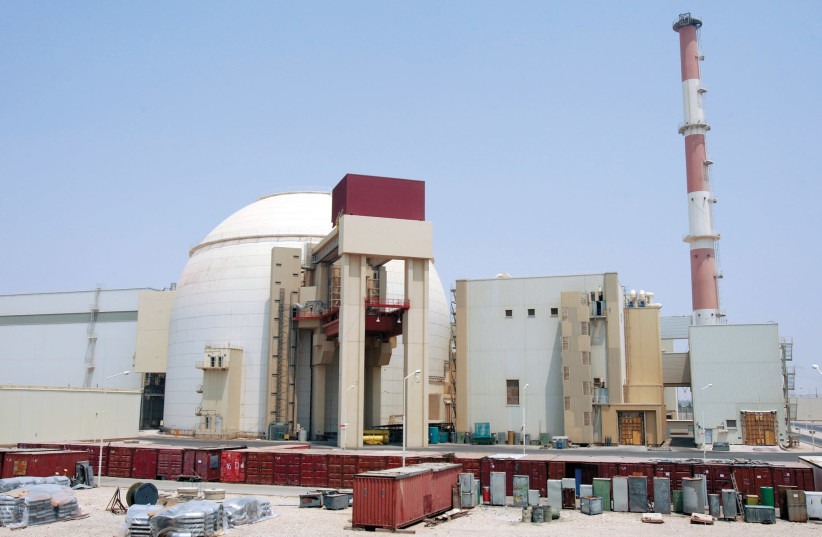Iran is activating "hundreds" of new and advanced IR6 and IR1 centrifuges to enrich uranium, Behrouz Kamalvandi, the spokesperson for the Iranian Atomic Energy Organization (IAEO) announced on Monday. 500 IR6 machines will be activated over the next 10 to 15 days, according to the announcement.
The spokesperson stated that the centrifuges were being activated as part of the “Strategic Action Plan to Lift Sanctions and Protect Iranian Nation’s Interest" and to reach a minimum enrichment level of 190,000 separative work units (SWU) to meet "the level of [Iran's] needs."
Kamalvandi added that the International Atomic Energy Agency (IAEA) has been informed of the move. On Tuesday, the Iranian Nour News reported that the new centrifuges were already installed in underground halls at the Natanz nuclear complex ahead of the announcement that they would be activated on Monday.
The significance of the 190,000 SWU goal
Iranian officials have stated in the past that 190,000 SWU is needed to fuel the reactors at the Bushehr power plant and Tehran nuclear facility.

According to the Institute for Science and International Security, the goal of 190,000 SWU cited by Iranian officials usually converts to about 128,000 SWU in more standard units, as Iranians are usually measuring based on uranium hexaflouride (UF6) instead of the more standard basis of uranium (U).
"Such a program from a nuclear weapons vantage is huge for a country like Iran."
The Institute for Science and International Security
In a report from December, the Institute for Science and International Security stressed that while that amount is relatively modest from a commercial vantage point, "such a program from a nuclear weapons vantage is huge for a country like Iran."
"Merely installing one tenth of that capacity of 128,000 SWU per year is sufficient to produce enough weapon-grade uranium for more than one bomb per year. With a sufficient stock of low enriched uranium, Iran could produce enough weapon-grade uranium for over five weapons per year."
That same report stressed that about 650 IR-6 centrifuges would be enough to breakout and produce enough weapon-grade uranium for a nuclear weapon in about one month. In June, Iran informed the IAEA that it had begun activating 166 IR-6 centrifuges. The IAEO announced on Monday that it was activating another 500 IR-6 centrifuges, which would bring the total number of such centrifuges activated to at least 666.
Announcement come just hours after US sanctions companies linked to Iranian petroleum
The announcement comes just hours after the US Department of the Treasury announced a list of sanctions against companies used by Iran’s Persian Gulf Petrochemical Industry Commercial Co. (PGPICC) to sell tens of millions of dollars' worth of Iranian petroleum and petrochemical products to East Asia.
The sanctions targeted the UAE-based Blue Cactus Heavy Equipment and Machinery Spare Parts Trading L.L.C. and the Hong Kong-based Farwell Canyon HK Limited and Shekufei International Trading Co., Limited. The Hong Kong- and Malaysia-based PZNFR Trading Limited was targeted as well.
“The United States continues to pursue the path of diplomacy to achieve a mutual return to full implementation of the Joint Comprehensive Plan of Action,” said Under Secretary of the Treasury for Terrorism and Financial Intelligence Brian E. Nelson. “Until such time as Iran is ready to return to full implementation of its commitments, we will continue to enforce sanctions on the illicit sale of Iranian petroleum and petrochemicals.”
The State Department also designated Pioneer Ship management PTE LTD and Golden Warrior Shipping, Co. Ltd. for engaging in transactions related to Iranian petroleum and petroleum products. The vessel Glory Harvest was also designated as blocked property of Golden Warrior Shipping.
EU presents sides in JCPOA talks with new proposal
US Secretary of State Antony Blinken told the press outside the NPT Review Conference on Monday that "the European Union has put forward a best proposal based on many, many months of discussion, negotiations and conversations."
"It's very consistent with something that they put forward in March that we agreed to that we'd pursue in March but it remains to be seen whether Iran is willing and able to move forward. We remain prepared to move forward on the basis of what's been agreed," said Blinken.
In a joint statement on Monday, France, the UK and the US stressed that "Iran must never develop a nuclear weapon" and expressed regret that "despite intense diplomatic efforts, Iran has yet to seize the opportunity to restore full implementation of the JCPOA."
Iranian Foreign Minister Hossein Amirabdollahian stated on Tuesday that the activation of the centrifuges was announced in response to the sanctions issued by the US.
"The Americans should not think that they can score points at the negotiating table with these actions," said Amirabdollahian.
The foreign minister stated on Monday that Iran was reviewing a draft proposal presented by the EU's foreign policy chief Josep Borrel based on the views of the different parties in the negotiations to return to the JCPOA nuclear agreement.
Amirabdollahian stressed that Iran is "serious about reaching a strong, good and stable agreement," adding that "if the American side is realistic and has the necessary flexibility in the possible negotiations ahead, reaching an agreement will not be far from reach."
